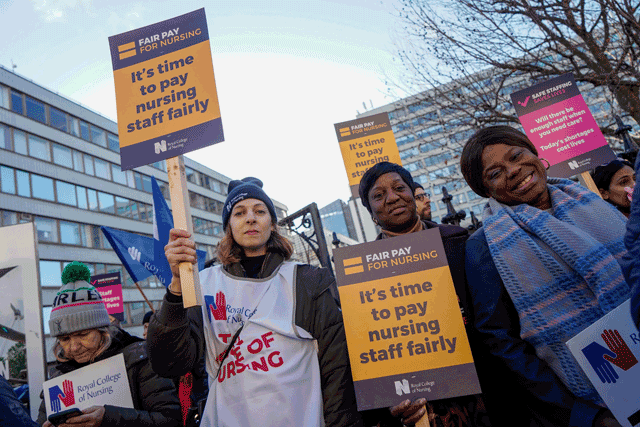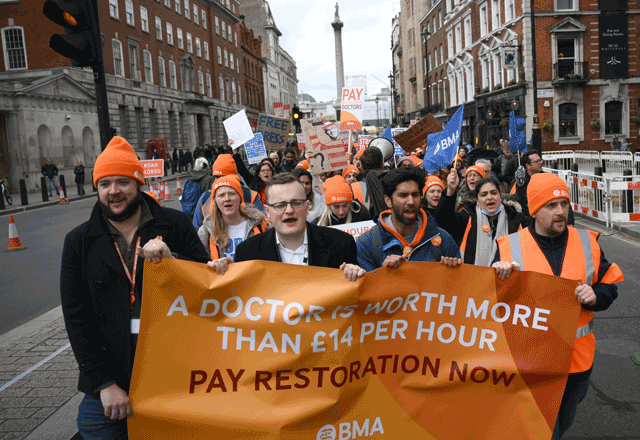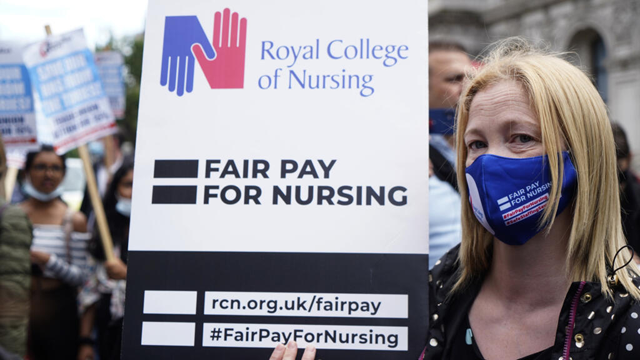You are here
Ambulance workers walk out in strike-hit UK
By AFP - Dec 21,2022 - Last updated at Dec 21,2022

Ambulances are parked outside the Waterloo ambulance station in London on Wednesday (AFP photo)
LONDON — Striking ambulance workers in England and Wales manned picket lines on Wednesday, escalating a pay dispute with the government following walkouts by nurses and other public sector staff.
The series of stoppages are causing misery Britain in the run-up to Christmas, with railway workers and passport control officers set to ruin festive holiday getaways as the government vows to resist the growing pay demands.
As paramedics and call handlers walked out Wednesday, the government and unions furiously traded blame over the possible loss of life.
Health Secretary Steve Barclay, writing in the Daily Telegraph newspaper, accused the unions of making a "conscious decision" to "inflict harm" on patients.
GMB union national secretary, Rachel Harrison, hit back calling his comments "insulting" to ambulance workers, who were "forced" to strike "because year after year the government has failed to listen to them".
Employees across the UK economy are demanding salary rises above decades-high inflation — currently running at nearly 11 per cent — which is spurring the worst cost-of-living crisis in a generation.
On Tuesday, thousands of members of the Royal College of Nursing (RCN) in England, Wales and Northern Ireland took to picket lines, five days after their first strike in its 106-year history.
Unions representing both nurses and ambulance workers in the state-run National Health Service (NHS) have threatened further stoppages in the new year if the government keeps refusing to discuss pay.
'Immense pressure'
Around 40 staff formed a picket line outside West Midlands Ambulance Services' hub in Longford in central England, standing behind a banner reading "our NHS is under siege".
As passing ambulances sounded their horns in support, a Unite union representative, Steve Thompson, said the walkout was about trying to retain and improve services, as well as pay.
"This is about telling them [the government] that we are not going to allow it [a deterioration in services] to happen. We are not going to roll over," he said.
"We want the government to actually wake up and realise that this situation is serious."
Adrian Boyle, president of the Royal College of Emergency Medicine, said the UK's emergency health system had been under "immense pressure" for the last three years.
He told Times Radio the last year had been "the worst we've ever seen it" when it came to delays in getting patients into hospital from ambulances due to a lack of beds.
And he said accident and emergency departments were expecting people to make their own way to hospital on Wednesday — even those with strokes and heart attacks.
The government insists it must stick to modest increases for public sector workers recommended by independent pay review bodies.
"The best way to help them and help everyone else in the country is for us to get a grip and reduce inflation as quickly as possible," Prime Minister Rishi Sunak has said.
But the RCN has criticised the government's stance and accused Barclay of adopting a "macho" negotiating style during recent brief meetings.
It has warned that nurses would take wider industrial action next month if the government "keeps giving our nursing staff the cold shoulder".
Ministers have drafted in 750 military personnel to drive ambulances and perform logistics roles to mitigate the impact of Wednesday's ambulance strike which will affect almost all areas of England and Wales.
Despite the government's insistence that it will not negotiate, polls indicate most people support nurses, and to a lesser extent other workers walking out.
YouGov polling published on Tuesday showed two-thirds of Britons support striking nurses, with 63-per cent support for ambulance staff.
Related Articles
LONDON — UK nurses on Tuesday staged a second one-day strike amid an increasingly acrimonious fight with the government for better wages and
LONDON — Doctors working in England’s public health service on Tuesday launched what has been billed as the most disruptive strike in its hi
LONDON — Nurses across the UK have voted to strike in their first national action over a pay dispute, a media report said on Sunday.The stri














